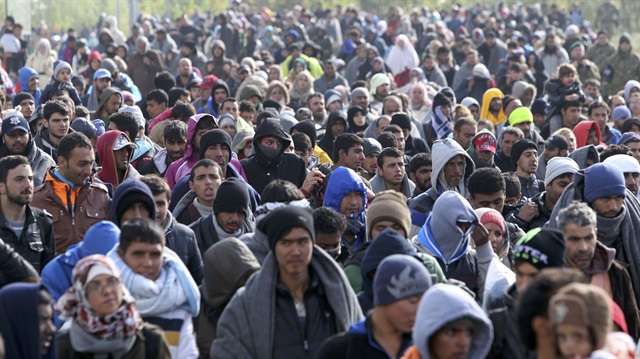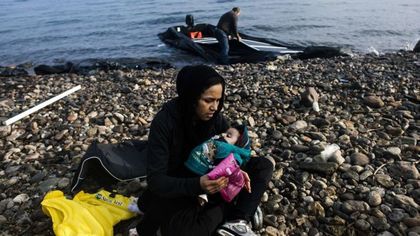In all, more than 650,000 refugees and migrants have crossed the Mediterranean to Europe this year and at least 3,135 have died en route, according to UNHCR.
 Over 500,000 have reached Greece this year
Over 500,000 have reached Greece this year
The number of migrants who have arrived in Greece this year has topped half a million, the United Nations said.
The rate of people arriving has risen to 8,000 a day, the UN's High Commissioner for Refugees said, with many hoping to beat winter weather. Most migrants then head north from Greece, but bottlenecks are forming in some Balkan states.
The number of migrants reaching Europe has reached record levels in 2015:
UNHCR spokeswoman Melissa Fleming said 27,500 people remained in transit on Greek islands near Turkey, many voicing fears that borders ahead of them in northern Europe will close again.
People smugglers are offering "discount rates" to some passengers leaving Turkey but are packing ever more people onto each boat, making conditions even more dangerous, Fleming explained.
“GREECE IS DOING WHAT IT CAN”
"Obviously Greece is doing what it can, it's pulling in additional police. But we need to repeat over and over again that it is of utmost importance here that reception conditions be established and be adequate to this enormous task," she affirmed.
"Without this essential element, the relocation programme that was agreed by Europe in September is in serious peril and may fail. One system can't work without the other."
She was referring to a European Union programme to distribute 160,000 asylum seekers from Italy and Greece to other participating EU countries. Only 19 migrants have been relocated in the last months, all Eritreans, who have moved from Italy to Sweden.
 The number of migrants reaching Greek shores is at record levels
The number of migrants reaching Greek shores is at record levels The relocation plan "is in serious peril and may fail", Ms Fleming added.
"We have reached another dramatic milestone, with the arrival of 8,000 people, bringing the total to 502,500. Obviously we knew this was coming, but we do see a spike in arrivals in Greece," Fleming told the press.
"We are reporting 25 deaths in the Aegean Sea this week, many of them children," said Joel Millman of the International Organization for Migration (IOM).
CROATIA AND SLOVENIA
Hungary closed its southern border with Croatia on Friday night, citing security concerns. The decision forced migrants to switch to a slower route via Slovenia.
Croatia and Slovenia imposed strict controls as a result, but those restrictions appeared to be relaxed on Monday night as many people waited in wet and windy conditions.
Slovenia said on Tuesday it would deploy the army to help guard its border and appealed for help from fellow members of the European Union.
Slovenia has called on European Union member states to help with the influx of migrants who have entered the country over the past few day Prime Minister Miro Cerar said the current numbers were beyond anything the small country could cope with.
"It is wrong to foster the illusion that it is possible for a small nation of two million people to stop, solve and rectify a situation where even much bigger EU member states have failed," he declared.

Las opiniones vertidas por nuestros colaboradores se realizan a nivel personal, pudiendo coincidir o no con la postura de la dirección de Protestante Digital.
Si quieres comentar o